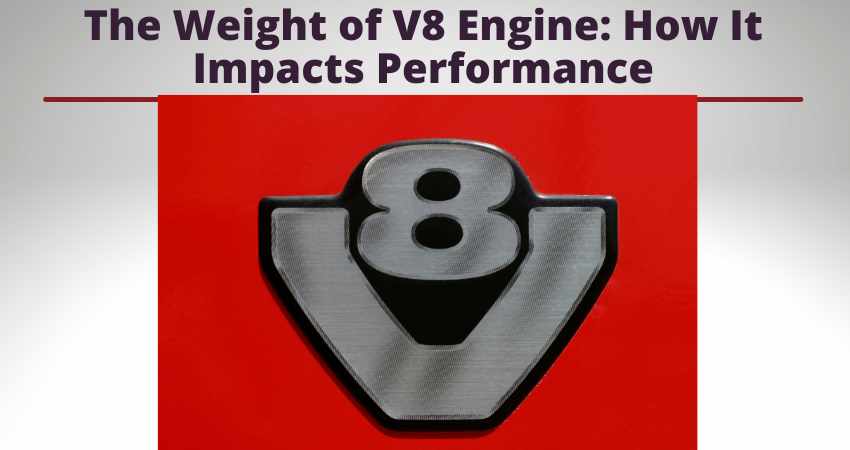Don’t let the weight of your engine hold you back from enjoying its performance. A V8 engine is one of the most powerful engines in existence, capable of pushing colossal amounts of displacement and weight. But before you can enjoy the engine’s performance, it is important for you to understand its weight and how it affects performance.

What is a V8 engine?
A V8 engine is a type of engine with eight cylinders. It gets its name from the number of cylinders it has, which is also known as the engine’s “bank” size. Like other engines, a V8 engine contains a cylinder block, cylinder heads, and pistons. The cylinder block is made of cast iron or aluminum and supports the engine’s cylinders. The cylinder heads are also made of either cast iron or aluminum and contain the intake, exhaust, and spark valves for each cylinder.
A V8 engine has an efficient design that provides high power and torque. This type of engine is used in many applications because of its ability to produce high horsepower and high torque for long periods at high engine speeds. The durability and longevity of a V8 engine make it an attractive option for vehicles with high power demands.
A V8 engine is capable of producing high power and high torque for long periods at high engine speeds. It is durable and reliable and suitable for vehicles with higher power demands.
What are the weight and dimensions of a V8 engine?
-The weight and dimensions of a V8 engine affect its performance. A lighter weight and smaller dimensions will result in better engine performance than a heavier engine of the same size. A 1953 303i 5.0litre Olds V8 had 135hp and weighed 700lbs (317Kg).
-A V8 engine with a lighter weight and smaller dimensions will perform better. Make sure to consult a qualified technician if you are unsure about the weight and dimensions of your V8 engine.
-When purchasing or modifying a V6 or V8 engine, be sure to account for the weight and dimensions of the engine, as they will affect its performance. A 2002, 256ci 4.3litre Aston Martin AJ-V8 derived engine has 380hp and weighs only 441lbs
How does the weight of a V8 engine affect performance?
The weight of a V8 engine affects both the power and fuel efficiency of the vehicle. A heavier engine requires more fuel to operate, resulting in less power per unit of fuel. In addition, heavier engines tend to be less aerodynamic and resist engine stall better, making them more difficult to accelerate from a stop. For example, a heavy engine might require more torque for acceleration than a lighter engine does for the same amount of weight. When comparing vehicles with similar weight categories, the heavier vehicle will likely have lower fuel efficiency due to its larger engine size and weight.
The weight of a V8 engine also has an effect on how smoothly the vehicle accelerates and stops. A heavier engine creates more inertia and resistance, resulting in longer times for acceleration or deceleration. This can negatively impact vehicle performance and fuel efficiency.
What are some possible problems caused by the weight of a V8 engine?
The weight of a V8 engine can cause a variety of problems. The increased weight on the engine can affect fuel economy and performance in a variety of ways. It can lead to vibrations and noise, which can negatively affect the engine’s reliability. It also may make it harder for the vehicle to handle or improve its aerodynamics. Finally, an increased weight on the engine can have an impact on the car’s acceleration and overall performance. Overall, an engine with too much weight will struggle to perform at its best.
Frequently Asked Questions
How can I reduce the weight of my V8 engine?
There are a number of ways to reduce the weight of your V8 engine.
Some methods include cutting weight from the engine, chassis, and transmission. Other methods include modifying the engine internals.
It is important to weigh all of the pros and cons of any modifications before making them. This way, you’ll know for sure if it’s worth your time and effort.
How Much Do Locomotives Weigh?
Conclusion
The weight of the engine does not affect the engine’s performance or fuel efficiency. It does, however, affect engine torque and top speed. Heavy engines require more fuel to move an object, which in turn lowers their fuel efficiency. The weight of an engine affects fuel consumption because of the additional weight needed for engine support and other structures needed for engine operation. When an engine is heavy, it may need extra care and maintenance to function properly. A heavy engine also requires more space to keep it stable while driving and moving. If you are looking for a reliable car engine, go for a V8 engine. They have proved their worth over the years!
Mr. Jahangir Alam is an Electrical & Electronics Engineer with a wide range of experience in several fields of Engineering. He finds engineering articles to be very interesting, and that is why he likes to write them. To know more about him, please click here.

